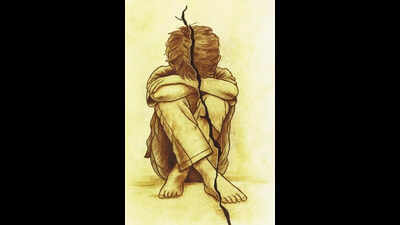ARTICLE AD BOX

Social stigma associated with same-sex sexual contact is another significant barrier to disclosing abuse and seeking support
Sexual abuse of boys is not really abuse, it’s just boys horsing around. That’s just one of the several misconceptions Alankaar Sharma has had to contend with as an educator who researches male sexual violence and abuse.
Some of the others, he says, are that sexual abuse of boys is rare, perpetrated primarily by gay men and that if a boy experienced pleasure in the context of abuse, ‘it’s not really abuse because he must have wanted it’.“Child sexual abuse remains an emotionally painful and distressing experience in the lives of many adult men survivors even decades after the abuse took place,” says Sharma, who works at the School of Health and Society at the University of Wollongong in Australia.
Sharma was in Chennai on Wednesday for a seminar hosted by Tulir — Centre for the prevention and healing of child sexual abuse.Men and boys who have experienced sexual abuse in childhood are more likely to consider or attempt suicide, he says.
“Child sexual abuse may also influence men survivors’ behaviour in relation to addictive alcohol consumption and substance use.” It has also been found to influence sexual behaviour in later life, such as sexual addiction, compulsivity or hyperactivity; sexual inhibition or avoidance; and problems with sexual touch or arousal.
Although research shows one in six boys worldwide experiences sexual abuse during childhood, their experiences have remained under-researched, under-examined and under-addressed, says Sharma. In India, one of the only large-scale studies done in the area was in 2007 by the Union ministry of women and child development, which found that 53% of boys aged five to 18 years had experienced sexual abuse and 23% had experienced a severe form (defined as sexual assault, making the child fondle private parts, making the child exhibit private body parts, exhibiting private body parts to a child, photographing a child in the nude).In a 2020 survey of 6,300 parents, Early Childhood Association found 85% of parents felt boys are not sexually abused, only girls are.“They also related abuse more to penetration and believed touching ‘private parts’ is child sexual abuse and that touching other body parts in children is not,” says Swati Popat Vats, president of Early Childhood Association, which educates teachers, parents and caregivers on prevention of child sexual abuse.Within a patriarchal context, boys and men are expected to always seek or enjoy sexual contact, says Sharma. “Masculinity is typically equated with emotional toughness, and emotional vulnerability that often accompanies victimisation is construed as unmasculine.”In his study published in The British Journal of Social Work in 2022, Sharma had interviewed male child sex abuse survivors from different parts of India.One of them, Jimmy (name changed), who was in his 30s when interviewed, said that because some of the sexual activities in his abuse experiences were with women, he feared others would not take them seriously. “When a boy says, ‘I was abused,’ it’s difficult to digest. ‘Man up! You just got to have sex with a 20-year-old woman, what’s wrong with you?’ This is the stuff that goes down in history, you know. A nine-year-old having sex with a 20-year-old girl! You should be happy.
What are you cribbing about?” says Jimmy, whose first experience of abuse was at the age of six.Studies have also shown that though girls are about thrice as likely to be sexually abused, boys and men are less likely to disclose abuse and more likely to delay disclosure. “Prevailing norms of patriarchy that hinge on staying strong, not sharing or telling, being invulnerable is a barrier to boys’ ability to talk about their abuse experiences and seek support,” says Sannuthi Suresh, programme coordinator at Tulir-CPHCSA.
Men and boys are expected to be physically and emotionally strong and this makes them believe they failed to protect themselves and consequently feel guilty and responsible for their abuse.Social stigma associated with same-sex sexual contact is another significant barrier to disclosing abuse and seeking support. “Most child sexual abuse perpetrators are males regardless of the victim’s gender,” says Sharma.
“Patriarchy expects men and boys to be heterosexual and same-sex sexual contact is heavily stigmatised. Regardless of their sexual orientation, they often worry about being labelled gay when abused by other men, and therefore hesitate to disclose or seek help.
”Govind, 40, a survivor Sharma interviewed, says, “I don’t know whether I have actually survived the sexual abuse, or if I have survived insanity, or killing myself.”
He also mentions having impulses of “sexual suicides”, “practising unsafe sex” to contract HIV and die.Interventions, says Sharma, need to focus on educating and sensitising the public as well as parents, NGOs, therapists, physicians and teachers towards acknowledging that male child sexual abuse exists and is an important problem, as well as on understanding how restrictive patriarchal expectations of boys regarding masculinity put an immense and unfair burden on male survivors.“There is hardly any support that is tailored to their narratives. Many times, mental health professionals, quite insensitively, lump male child survivors’ experiences with those of girl survivors,” says Sannuthi.Research on child sexual abuse is a developing field in India, says Sharma, and therefore largely studied from a biomedical perspective. “It is important to hear from survivors to develop practices and policies that are responsive to their concerns and rights.”BOX: OVERLOOKED REALITY



.png)
.png)
.png)
















 9 hours ago
5
9 hours ago
5









 English (US) ·
English (US) ·